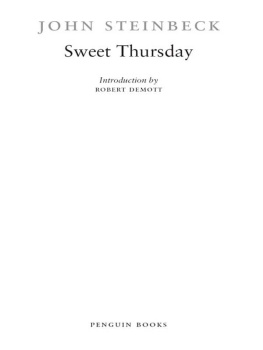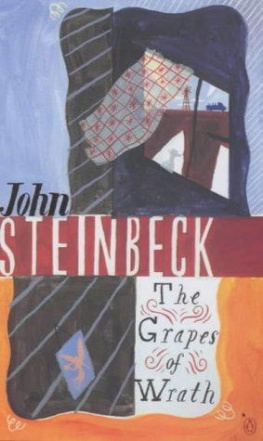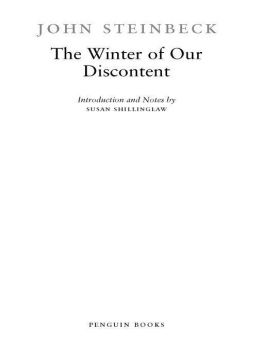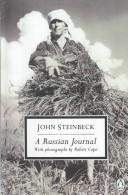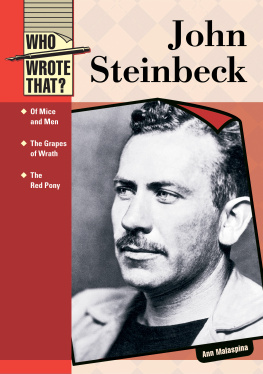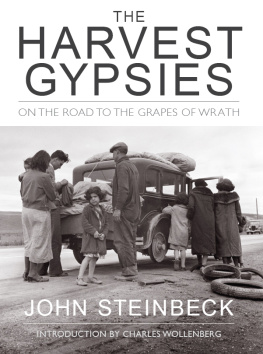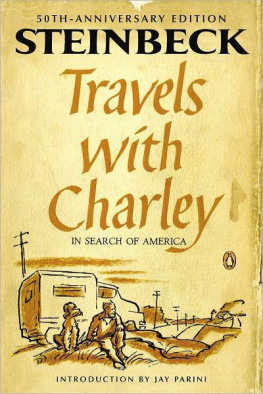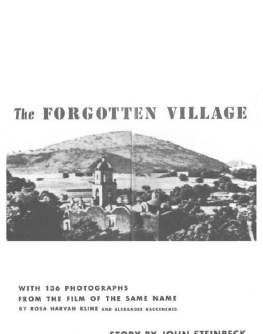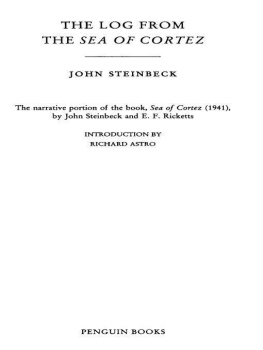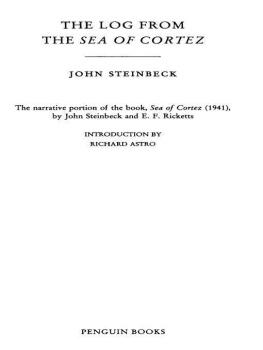John Steinbeck - Sweet Thursday
Here you can read online John Steinbeck - Sweet Thursday full text of the book (entire story) in english for free. Download pdf and epub, get meaning, cover and reviews about this ebook. year: 2008, publisher: Penguin Books, genre: Art. Description of the work, (preface) as well as reviews are available. Best literature library LitArk.com created for fans of good reading and offers a wide selection of genres:
Romance novel
Science fiction
Adventure
Detective
Science
History
Home and family
Prose
Art
Politics
Computer
Non-fiction
Religion
Business
Children
Humor
Choose a favorite category and find really read worthwhile books. Enjoy immersion in the world of imagination, feel the emotions of the characters or learn something new for yourself, make an fascinating discovery.
- Book:Sweet Thursday
- Author:
- Publisher:Penguin Books
- Genre:
- Year:2008
- Rating:4 / 5
- Favourites:Add to favourites
- Your mark:
- 80
- 1
- 2
- 3
- 4
- 5
Sweet Thursday: summary, description and annotation
We offer to read an annotation, description, summary or preface (depends on what the author of the book "Sweet Thursday" wrote himself). If you haven't found the necessary information about the book — write in the comments, we will try to find it.
Sweet Thursday — read online for free the complete book (whole text) full work
Below is the text of the book, divided by pages. System saving the place of the last page read, allows you to conveniently read the book "Sweet Thursday" online for free, without having to search again every time where you left off. Put a bookmark, and you can go to the page where you finished reading at any time.
Font size:
Interval:
Bookmark:
 CLASSICS
CLASSICSSWEET THURSDAY
JOHN STEINBECK (19021968) was born in Salinas, California, in 1902, and grew up in a fertile agricultural valley about twenty-five miles from the Pacific coastand both valley and coast would serve as settings for some of his best fiction. In 1919 he went to Stanford University, where he intermittently enrolled in literature and writing courses until he left in 1925 without a degree. During the next five years he supported himself as a laborer and journalist in New York City and then as a caretaker for a Lake Tahoe estate, all the time working on his first novel, Cup of Gold (1929). After marriage and a move to Pacific Grove, he published two California fictions, The Pastures of Heaven (1932) and To a God Unknown (1933), and worked on short stories later collected in The Long Valley (1938). Popular success and financial security came only with Tortilla Flat (1935), stories about Montereys paisanos . A ceaseless experimenter throughout his career, Steinbeck changed courses regularly. The powerful novels of the late 1930s focused on the California laboring class: In Dubious Battle (1936), Of Mice and Men (1937), and the book considered by many his finest, The Grapes of Wrath (1939). Early in the 1940s, Steinbeck became a filmmaker with The Forgotten Village (1941) and a serious student of marine biology with Sea of Cortez (1941). He devoted his ser vices to the war, writing Bombs Away (1942) and the controversial play-novelette The Moon Is Down (1942). Cannery Row (1945), The Wayward Bus (1947), The Pearl (1947), A Russian Journal (1948), another experimental drama, Burning Bright (1950), and The Log from the Sea of Cortez (1951) preceded publication of the monumental East of Eden (1952), an ambitious saga of the Salinas Valley and his own familys history. The last decades of his life were spent in New York City and Sag Harbor with his third wife, with whom he traveled widely. Later books include Sweet Thursday (1954), The Short Reign of Pippin IV: A Fabrication (1957), Once There Was a War (1958), The Winter of Our Discontent (1961), Travels with Charley in Search of America (1962), America and Americans (1966), and the posthumously published Journal of a Novel: The East of Eden Letters (1969), Viva Zapata! (1975), The Acts of King Arthur and His Noble Knights (1976), and Working Days: The Journals of The Grapes of Wrath (1989). He died in 1968, having won a Nobel Prize in 1962.
ROBERT DEMOTT, recipient of the 2006 Trustees Award from the National Steinbeck Center, is the Edwin and Ruth Kennedy Distinguished Professor at Ohio University, the author of Steinbecks Typewriter , an award-winning book of critical essays, and the editor of Working Days , a New York Times Notable Book. He lives in Athens, Ohio.
Introduction by
ROBERT DEMOTT
PENGUIN BOOKS
PENGUIN BOOKS
Published by the Penguin Group
Penguin Group (USA) Inc., 375 Hudson Street, New York, New York 10014, U.S.A.
Penguin Group (Canada), 90 Eglinton Avenue East, Suite 700, Toronto, Ontario, Canada M4P 2Y3
(a division of Pearson Penguin Canada Inc.)
Penguin Books Ltd, 80 Strand, London WC2R 0RL, England
Penguin Ireland, 25 St Stephens Green, Dublin 2, Ireland (a division of Penguin Books Ltd)
Penguin Group (Australia), 250 Camberwell Road, Camberwell, Victoria 3124, Australia
(a division of Pearson Australia Group Pty Ltd)
Penguin Books India Pvt Ltd, 11 Community Centre, Panchsheel Park, New Delhi - 110 017, India
Penguin Group (NZ), 67 Apollo Drive, Rosedale, North Shore 0632, New Zealand
(a division of Pearson New Zealand Ltd)
Penguin Books (South Africa) (Pty) Ltd, 24 Sturdee Avenue, Rosebank, Johannesburg 2196, South Africa
Penguin Books Ltd, Registered Offices:
80 Strand, London WC2R 0RL, England
First published in the United States of America by The Viking Press 1954
Published in Penguin Books 1979
This edition with an introduction by Robert DeMott published 2008
Copyright John Steinbeck, 1954
Copyright renewed Elaine A. Steinbeck, Thom Steinbeck, and John Steinbeck IV, 1982
Introduction copyright Robert DeMott, 2008
All rights reserved
LIBRARY OF CONGRESS CATALOGING IN PUBLICATION DATA
Steinbeck, John, 19021968.
Sweet Thursday / John Steinbeck; introduction by Robert DeMott.
p. cm.(Penguin classics)
Sequel to: Cannery Row.
Includes bibliographical references.
ISBN: 978-1-4406-3549-6
1. Monterey (Calif.)Fiction. I. Title.
PS3537.T3234S9 2008
813'.52dc22 2008016040
Except in the United States of America, this book is sold subject to the condition that it shall not,by way of trade or otherwise, be lent, resold, hired out, or otherwise circulated without the publishers prior consent in any form of binding or cover other than that in which it is published and without a similar condition including this condition being imposed on the subsequent purchaser.
The scanning, uploading and distribution of this book via the Internet or via any other means without the permission of the publisher is illegal and punishable by law. Please purchase only authorized electronic editions, and do not participate in or encourage electronic piracy of copyrighted materials. Your support of the authors rights is appreciated.
For
ELIZABETH
with love
I found it irresistible. Its quite a performance. I bet some of it is even true, and if it wasnt, it is now.
John Steinbecks dust jacket blurb on Gypsy Rose
Lees memoir, Gypsy (1957)
John Steinbeck was born in the agricultural community of Salinas, California, on February 27, 1902, to middle-class parents: John Ernst Steinbeck, a businessman who would later become Monterey County treasurer, and Olive Hamilton Steinbeck, a former schoolteacher. Steinbeck grew up in Northern California and was influenced from his earliest days by the regions diverse geographical landscape and its common people, which, along with his interest in democratic principles and social justice, remained foundations of his art for the rest of his life. Steinbeck attended Salinas High School, where he was an undistinguished but bookish student, then enrolled sporadically at Stanford University from 1919 to 1925. An English-journalism major, he took a short-story-writing class from Professor Edith Mirrielees and was published in Stanfords undergraduate literary magazine, but because he was restless and craved adventure, he never finished his degree. He held a variety of temporary jobs during the next four years (laborer and cub reporter in New York City, fisheries manager, and resort handyman and caretaker at a private estate near Lake Tahoe), eventually publishing his first novel, Cup of Gold, in 1929. The book, a historical novel about the seventeenth-century pirate Henry Morgan, scarcely sold, but Steinbecks choice of vocation was sealed. He never again held a traditional nine-to-five job. Beginning in 1930, with the support and encouragement of his parents and especially of his first wife, Carol Henning Steinbeck, whom he had married that year, writing became Steinbecks daily occupation, and it continued so through lean and flush times for the remainder of his life. When Steinbeck, who had left California in the early 1940s, died in New York City on December 20, 1968, he had managed to support himself and his families (he was married three times and had two sons and one stepdaughter) exclusively on his writing-based income, primarily from the thirty books of fiction, drama, film scripts, and nonfictional prose he published between 1929 and 1966, many of them translated into numerous foreign languages worldwide. In 1962 Steinbeck was awarded the Nobel Prize in Literature, for his realistic and imaginative writings, combining as they do sympathetic humour and keen social perception, according to the Swedish Academy, which administers the award. Steinbeck was only the seventh American writer to have been chosen since the prestigious prizes inception in 1901, yet his election provoked vehement and highly publicized reactions among his critics, who wondered aloud whether he deserved the award. In his acceptance speech, delivered on December 10, 1962, in Stockholm, the humble and self-deprecating Steinbeck confessed, there may be doubt that I deserve theawardover other[s] whom I respect and reverencebut there is no question of my plea sure and pride in having it for myself.
Font size:
Interval:
Bookmark:
Similar books «Sweet Thursday»
Look at similar books to Sweet Thursday. We have selected literature similar in name and meaning in the hope of providing readers with more options to find new, interesting, not yet read works.
Discussion, reviews of the book Sweet Thursday and just readers' own opinions. Leave your comments, write what you think about the work, its meaning or the main characters. Specify what exactly you liked and what you didn't like, and why you think so.

